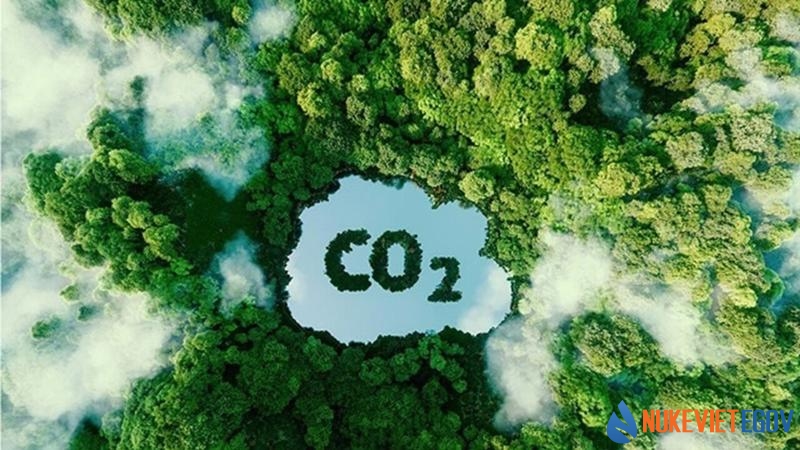Carbon credit trading: Great potential in Agriculture

Vietnam is recognized as having substantial potential in the supply of carbon credits. Based on calculations, the agriculture sector alone could generate 57 million carbon credits annually, equivalent to absorbing 57 million tons of CO2...
Leading a discussion with carbon credit experts on emission reduction in agriculture, Minister of Agriculture and Rural Development Le Minh Hoan remarked: "In the future, the carbon credit trading market will become increasingly active. Therefore, Vietnamese agriculture needs to anticipate this trend to maximize profits."
SELLING "AIR" FOR REAL MONEY
Carbon credits are tradable certificates representing the right to emit a certain amount of CO2 or other greenhouse gases converted to equivalent CO2. Each credit is equivalent to 1 ton of CO2 or its equivalent in converted CO2.
According to the Ministry of Agriculture and Rural Development, the trading of emission reduction credits on the market is an advanced method increasingly adopted by many countries, creating a carbon market or a market for trading emission reduction credits. This market involves the buying and selling of greenhouse gas reductions or absorptions. Participants can be businesses trading with each other or between domestic and international organizations, which may include financial institutions or companies.
In recent years, Vietnam has successfully executed carbon credit deals, earning around $60 million. The Bio-Gas Program in Vietnam's livestock sector has been implemented in 53 provinces, resulting in the construction of 181,683 biogas projects benefiting one million rural residents.
International organizations have praised Vietnam's Bio-Gas Program for contributing to greenhouse gas reduction. Through this program, Vietnam has sold 3,072,265 carbon credits, generating $8.1 million in revenue.
Notably, in 2023, Vietnam's forestry sector successfully sold 10.3 million forest carbon credits (equivalent to 10.3 million tons of CO2) through the World Bank. With a credit price of $5 per ton of absorbed carbon, the total contract value reached $51.5 million. The World Bank has paid the first installment of $41.2 million to the Ministry of Agriculture and Rural Development, equivalent to 80% of the contracted emission reduction results. The remaining $10.3 million will be paid after the transfer of the remaining 10.3 million tons of CO2.
Le Hoang The, Director of The VOS Ecosystem Company, stated that Vietnam is among the countries leading in the growth rate of carbon emissions. Vietnam ranked in the top 20 countries with the highest carbon emissions in 2022, with a growth rate of 57.3% from 2010 to 2022, placing it in the top 10 countries with the highest growth rate worldwide. The energy and industrial sectors have increasingly contributed to Vietnam's carbon emissions over the past 12 years.
Le Hoang The also emphasized that Vietnam has significant potential in supplying carbon credits and is expected to bring high economic benefits as global demand is forecasted to increase nearly 100 times by 2050. Various agricultural activities, from livestock farming and cultivation to reforestation, show promise in transitioning to practices that reduce greenhouse gas emissions, such as eco-friendly and organic farming.
"Currently, each carbon credit (equivalent to reducing 1 ton of CO2 emissions) is being purchased by international organizations for $5. In the Vietnamese agricultural sector alone, the calculated potential could reach 57 million carbon credits per year (equivalent to reducing 57 million tons of CO2 emissions), which could be sold to international organizations, bringing in nearly $300 million annually," Le Hoang The asserted.

CHANGING MINDSET TO ADAPT TO TRENDS
Amidst Vietnam's implementation of green and circular economic programs and its commitment to the United Nations' climate change goals, including achieving net-zero carbon emissions by 2050, Le Hoang The believes that Vietnam needs a large and professional workforce to implement the central solution of establishing a mandatory carbon credit market. This workforce should possess in-depth knowledge of accreditation mechanisms, relevant documentation, reporting, and evaluation of various carbon credits.
"Nowadays, people don't just buy products; they also buy the process of making those products. Our story is about changing our mindset to adapt to the changing trends in the world, which is essential. Scientific thinking must change, business thinking must change, and our thinking must change too. Open-mindedness, quick action, and tangible results are crucial," emphasized the Minister. He further emphasized that in the future, farmers won't just sell rice, fruit growers won't just sell fruit, and forest planters won't just sell timber. Agricultural production will also involve selling carbon credits. "Don't think of 'selling air' as something impossible; in reality, we have already sold fresh money. In the future, the carbon credit trading market will become lively, so Vietnamese agriculture needs to anticipate this trend to maximize profits."
The article was published in the Vietnam Economic Journal, issue 03-2024, released on January 15, 2024. Readers are invited to read the full content here: https://postenp.phaha.vn/chi-tiet-toa-soan/tap-chi-kinh-te-viet-nam
Reader Comments

